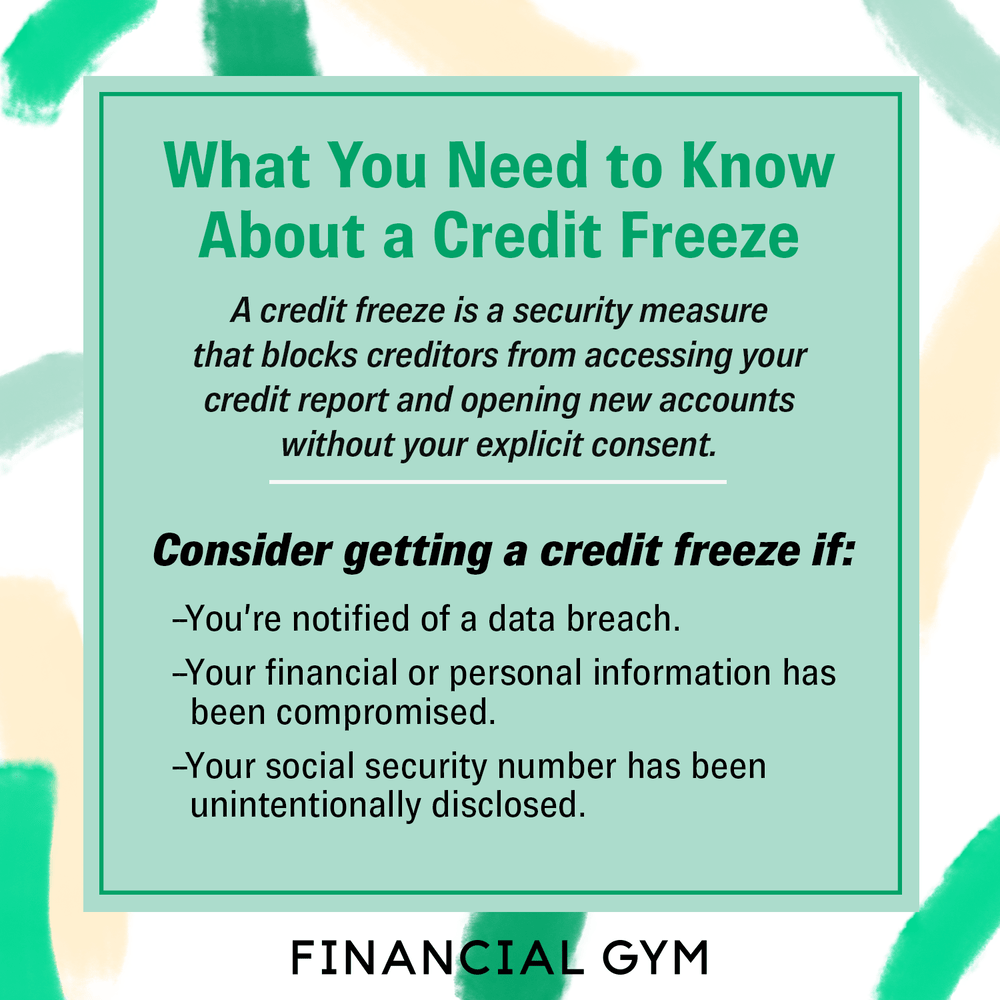What You Need to Know About a Credit Freeze
According to a recent Javelin identity fraud study, 14.4 million consumers were victims of identity fraud in 2018. Identity thieves may target your banking information or access your sensitive personal information through companies whose services you’ve used.
If your personal information is compromised, you may be at risk of having your identity stolen — which can wreak havoc on your finances and quickly consume all aspects of your life. If you’re worried your identity may be at risk, a credit freeze may help prevent further identity theft.
What is a credit freeze?
A credit freeze is a security measure that blocks creditors from accessing your credit report and opening new accounts without your explicit consent. You and your current creditors will still have access to your records, but new creditors won’t be able to view the required financial data that’s needed to approve a credit application.
Freezing a credit report is free, and doesn't affect your credit score. To freeze your credit, you’ll need to contact each of the major credit bureaus — Equifax, Experian, TransUnion — by phone, mail or online.
The credit freeze remains in place until you say otherwise. You can temporarily lift the freeze when you want to apply for new credit or permanently unfreeze it at any time.
Your credit report isn’t completely locked down
Although a credit freeze restricts access to your credit reports for most entities, your reports may be viewed by:
Companies that monitor your credit as part of a subscription service.
Companies that give you a copy of your credit report or score with your permission.
Marketing companies can still view your reports to send you offers.
Government agencies and courts may gain access depending on certain circumstances.
Should you freeze your credit?
If you aren’t actively searching for a new line of credit, a credit freeze is an extra precaution to protect your sensitive data. But there are some instances where you should get a credit freeze as soon as possible.
Consider getting a credit freeze if:
You’re notified of a data breach.
Your financial or personal information has been compromised.
Your social security number has been unintentionally disclosed.
How to unfreeze your credit
If you’re applying for credit, you can save yourself time and energy by asking the creditor which credit bureau it uses to evaluate your creditworthiness. You can then choose to only unfreeze that particular report.
However, you may want to unfreeze your credit reports with all three bureaus if you’re planning on shopping around for a loan and will need to complete multiple applications within a short period of time.
To unfreeze your credit, contact each credit bureau directly. You’ll need to enter the unique PIN or password that was established when you initially requested the freeze. According to law, the freeze must be lifted within an hour, unless you’re making the request by mail which can take up to three business days from receipt of the request.
If you don’t want to unfreeze your credit long-term, you can designate a specific period of time for the temporary lift — after which, the freeze automatically resumes.
Credit freeze alternatives
Although it’s not as strong as a credit freeze, a fraud alert is a separate security measure that can help prevent identity theft. A fraud alert requires companies to jump through extra hoops to verify your identity before accessing your credit report. However, it’s not foolproof. A credit freeze provides more protection because new lenders will only be able to access your credit if you explicitly lift the freeze.
You can also choose to initiate a credit lock, which is similar to a credit freeze, but is typically offered through a subscription-based service. Each of the major credit bureaus offers a credit lock product that allows you to lock and unlock your credit report online or through their app. The primary drawbacks of a credit lock are that it may require a monthly fee and it isn’t governed by federal law, so the terms of use can be changed at any time.
There may be alternative ways to protect yourself, but freezing your credit is a sound financial practice that's free and relatively convenient. It’s a great tool to add an extra layer of protection if you aren’t currently shopping for a credit card or other loan. Just keep in mind that you’ll need to unfreeze your reports before applying for new credit.
We recommend placing a credit freeze with the major credit bureaus immediately if you believe your financial data has been compromised in any way.

